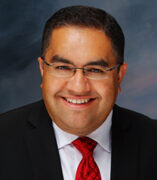
M. Jawad Javed, MD
Neonatology Fellowship Program Director; Neonatology Section Chief/Medical Director
Professor of Clinical Pediatrics
Neonatal-Perinatal Fellowship
Department of Pediatrics
Pediatrics Residency
Pronouns: he/him/his
Contact
Address:
530 NE Glen Oak Ave, Peoria, IL 61637
About
Dr. Javed is deeply committed to advancing newborn care and improving outcomes in neonatology. He is actively involved in various faculty committees focused on scholarship, quality improvement, research, and patient outcomes at OSF HealthCare Children’s Hospital of Illinois and the University of Illinois College of Medicine.
In addition to his professional responsibilities, Dr. Javed is engaged in several community organizations, including Ronald McDonald House Charities of Central Illinois, Easterseals, and the Asian Indian Community Collaboration of Peoria. An enthusiast of Chicago sports, music, and traveling, he enjoys spending quality time with his wife, Zohra, and their three children.
Why I Chose Peoria
In addition to the incredible pathology that we see in our facility, the reason why I chose Peoria is the people. The collegiality and professional relationships is what gives Peoria an advantage. The learning environment is very supportive and feels like a family. This coupled with the incredible schools and quality of life make Peoria a wonderful place to have a career while raising a family.
Education
- Fellowship: Indiana University Purdue University Indianapolis Fellowship, Neonatal-Perinatal Medicine, 2008
- Residency: University of Illinois College of Medicine at Peoria Residency, Pediatrics, 2005
- Medical School: St. George's Univ School of Medicine Medical Education, 2001
- Undergraduate: Wabash College (Crawfordsville, IN) 1996
Licensures and Certifications
- Neonatal-Perinatal Medicine
- American Board of Pediatrics, 2012
Research Currently in Progress
- Medical Education
- Board Review Curricular Development
- Virtual/mixed reality in healthcare education
- Social determinants of health
- Medical-assisted machine learning